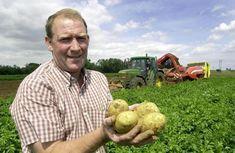
UK consumers may have enjoyed the low price of potatoes in supermarkets in the last two years, but returns realised by growers are causing concern to industry players who want the crop to remain a part of the UK's agricultural history.
Richard Clark, commercial director at Branston Potatoes, believes the last two years have made the situation difficult for growers. “Potato growers have suffered two successive seasons of poor returns, and these have come on top of difficulties in other areas. Not surprisingly, they have looked at the risks and rewards, and the result has been a reduction in plantings of 13 per cent this year compared with 2002,” he says. “Some suppliers who consistently failed to meet their customers' needs have faced the inevitable consequences, but others with good track records have been forced out by low returns.”
The 2002 planted area, approximately 138,700 hectares was a reduction on the previous year, but produced a record yield of 48.2 tonnes per ha and a total of 6.68 million tonnes. Clark says: “This was 10 per cent higher than in 2001 and resulted in the ex-farm average price falling to just £65.21 per tonne, which was £27 less than 12 months before.”
Any expansion in potato area has been for those growers who have been successful in meeting the demands of packers in terms of quality timing and price. “Our producer group, which works closely with us, grows principally for Tesco. It now plants more than 4,000 ha and realises reasonable returns because of its focused, highly professional approach,” he says. “This year our volume sales to Tesco have increased by nearly six per cent and we supply approximately 40 per cent of Tesco's fresh potatoes.”
Last year saw a reduction in the planting of the majority of major varieties by 11 per cent. Clark explains: “Maris Peer and Charlotte were the only varieties that did not see a fall in plantings. However, if planting did continue to fall this pattern could put increased pressure on the volumes available for packing.”
Clark remains positive about the chances of success for the forthcoming season. “The growing season started well, with planting undertaken in record time and was almost finished by late April,” he says. “Growing conditions were near perfect up to mid-July with warm soils, bright weather and intermittent rainfall resulting in most crops running at least seven to 10 days ahead of normal.”
At this stage the yield prospects of many crops were very high. But from mid-July to late August the heatwave changed the outlook. “The crop is likely to grow old before it fully matures,” says Clark. “Any substantial amount of rain on crops that have not been irrigated through the dry spell will do more harm than good now, producing secondary growth that could affect skin finish and produce new tubers rather than bulking up existing ones.”
Clark believes that although yield is likely to be lower than had been anticipated in mid-summer, the overall quality should be an improvement on 2002 with a reduction in blight and less scab in Maris Piper. “The additional factor of crop storage will be critical in determining the quality of the UK crop through the rest of the season,” he says.
There are also many changes and new pressures in the fresh potato market. There are increased commercial pressures to replace imports and extend the season for UK-produced new and baking potatoes. Clarke says: “These present new opportunities for UK growers and Branston's producer group has been successful in replacing imports with UK grown material in several sectors.”
This year Branston witnessed bigger volumes of Cornish new potatoes from late April. This reduced the quantity of Majorcan material which was imported for Tesco. “The Cornish material was also harvested in bigger volumes from the start, rather than building up gradually as in the past,” he says.
This is a key area for Branston for future developments. Large quantities of Charlotte salad potatoes in punnets replaced 1,000t of French and Spanish material in mid-May. Early-lifted Maris Piper took the place of imports from Israel in mid-June. Clark says: “In recent years we would have brought around 5,000t of potatoes from Cyprus to fill the gap before the first UK main crop became available. This year some of our growers started lifting Marfona in the second week of July, so no imports were required.”
With a wide array of dilemmas in the industry, the British Potato Council (BPC) has an essential role to play but Clark maintains that it does not have an easy task. “It is getting more difficult as resources are reduced and members want their own point of view to be represented more positively. We have been a strong supporter of the BPC for many years,” he says. “But I do wonder if it is possible for one body to represent all the different factions in the industry properly. We are living in interesting times.”






No comments yet